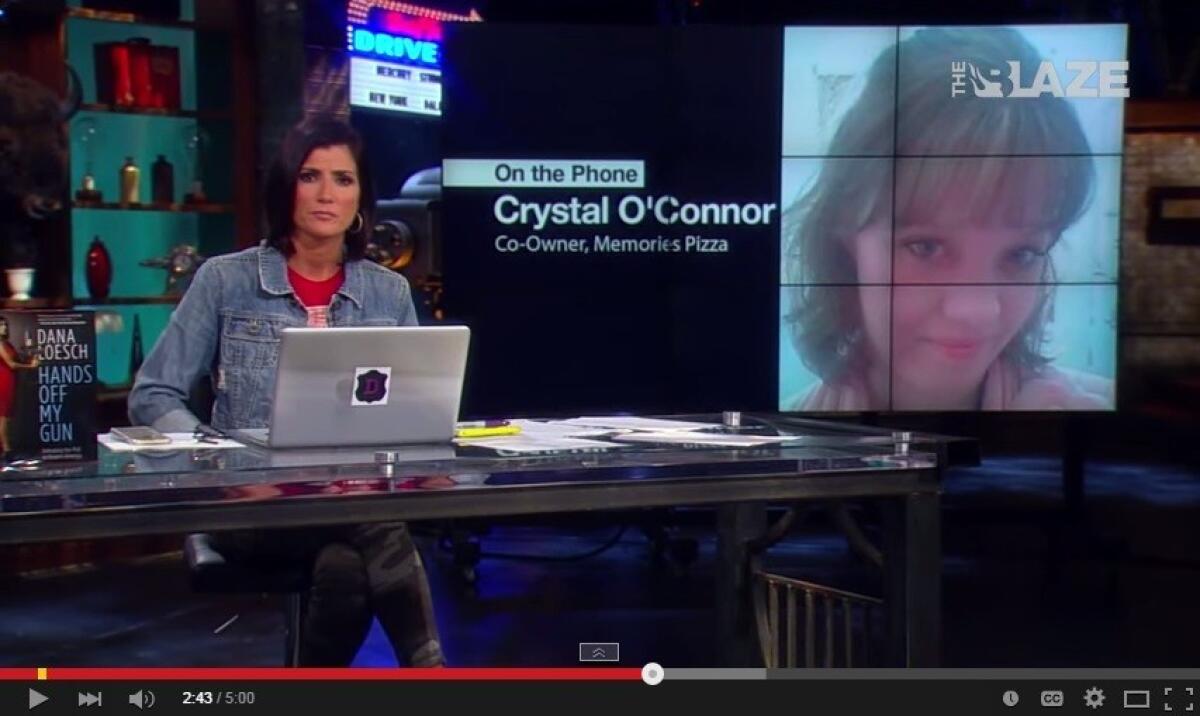Opinion: The backlash against the backlash against Indiana’s new religious freedom law

Not to go all M.C. Escher, but is someone who protests against intolerance guilty of intolerance?
That’s the question posed by the backlash against the backlash to Indiana’s Religious Freedom Restoration Act. Exhibit A is Memories Pizza of Walkerton, Ind., whose co-owner told a local television news reporter, “If a gay couple came in and wanted us to provide pizzas for their wedding, we would have to say no.” Explained Crystal O’Connor, whose family has owned the restaurant for nine years, “We are a Christian establishment.”
Her remarks circulated at the speed of the Interwebs, and not long thereafter the restaurant was inundated with protests. And as often happens on hot-button issues, some of the protesters went too far.
For example, the Yelp page for Memories Pizza suddenly attracted invective-filled reviews (plus a few racy photos of gay pizza deliverymen) from people who probably wouldn’t be caught dead in Walkerton. The outpouring of denunciation -- which included threats to burn down the pizzeria -- was enough to persuade the O’Connors to close their shop at least temporarily, with O’Connor telling Glenn Beck’s Blaze TV, “I don’t know if we will reopen.”
As the kids say, so much hate. There’s a bright, easily drawn line between boycotts designed to change a business’ practices and those designed to destroy a business and render its employees jobless. Regardless of what you think about the O’Connors’ beliefs, the threats against them cross that line.
The harder part -- and this goes to the heart of the debate over the Indiana law -- is how to draw the line between righteous boycotts and, well, intolerant ones.
The folks at TheBlaze TV were so outraged by how Memories Pizza was being treated, including how its story was being covered by much of the media, they started a crowdfunding campaign on GoFundMe to support the O’Connors. By 5 p.m. Thursday it had raised more than $284,000 from 10,193 pledges. Its original goal had been a mere $25,000.
The comments by donors reflect at least three motives. Some endorsed the O’Connors’ refusal to bake pizzas for gay weddings. Some expressed their support for business owners’ freedom to conduct their operations as they see fit. And some simply wanted to help out a family they believed to be the victims of a vicious public shaming.
As “Anonymous Dude” put it, “I am not a drone to shock reporting or mindless social media immolation. You guys did not deserve this. Good luck getting back on your feet.”
We’ve seen this cycle repeatedly online. Someone’s words or deeds will unleash a torrent of denunciations and protests -- see, e.g., Ferguson police officer Darren Wilson -- that cause a recursive backlash against the critics.
Where things get weird is when people protesting intolerance are themselves accused of intolerance. Some of the GoFundMe donors weren’t objecting just to the threats and the hateful tone of some of Memories Pizza’s boycotters, but to the boycott itself.
From the perspective of the boycotters, this is absurd. If I refuse to sell you my products or services because I disapprove of something about you, whether it be your race, your gender, your age, your sexual orientation or your religion, that’s garden-variety discrimination. Here, O’Connor said she wouldn’t bake pizzas for a gay couple celebrating their marriage. That hardly falls into a gray area.
The O’Connors’ defenders would probably argue that it’s not intolerant to shun something you think is wrong. And to the O’Connors and many of their supporters, gay marriage is wrong on a fundamental, core-religious-belief level. To other supporters, requiring people to do something that violates their beliefs is wrong, regardless of what one may think about those beliefs. That’s why the GoFundMe campaign for Memories Pizza has done so well.
But the same logic applies those who’ve shunned the restaurant in response to Crystal O’Connor’s comments. It’s silly to accuse the protesters of intolerance, as conservative pundit Timothy P. Carney did Monday, because they don’t want businesses to discriminate against gays. Again, it’s not intolerant to rail against behavior you think is wrong. Otherwise, every protest would be by its nature an act of intolerance, draining the word of its meaning.
By the way, O’Connor could have avoided the controversy simply by pointing out that her restaurant is dine-in only. It doesn’t make pizzas for anybody’s wedding reception. Meanwhile, O’Connor has said she has no problem serving gay people who come into the restaurant, even though nothing in Indiana law or Walkerton’s local ordinances appears to compel her to do so. Nor would the new state law change a thing on that front. From the restaurant’s perspective, the Religious Freedom Restoration Act is a non-issue. Or at least it should have been.
------------
FOR THE RECORD
April 3, 4:28 p.m.: The post was corrected to say that Memories Pizza was subjected to an outpouring of “denunciation,” not “approbation.”
------------
Follow Healey’s intermittent Twitter feed: @jcahealey
More to Read
A cure for the common opinion
Get thought-provoking perspectives with our weekly newsletter.
You may occasionally receive promotional content from the Los Angeles Times.











